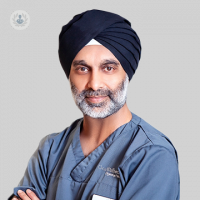Common causes of acid reflux
Written by:Acid reflux, sometimes referred to as heartburn, is a relatively common problem. But what if it is persistent? Dr Devinder Bansi, expert gastroenterologist, explains all about acid reflux symptoms, why it happens, and its typical treatment.
What is acid reflux?
Reflux refers to the movement of material from the stomach up into the oesophagus through a muscle that connects the two. That muscle is called the lower oesophageal sphincter. Usually it remains tight but when it becomes loose, the stomach contents will migrate back upwards.
Usually this means acid contents moving up, but sometimes the movement can be non-acid including food or air from time to time.
Why does acid reflux happen?
Acid reflux usually occurs because of an incompetence or ineffectual contraction of the sphincter - but some individuals will have a delay in emptying of the stomach so food sits around in the stomach for longer and as a consequence is more likely to come back up.
You may come across the term hiatus hernia which refers to the stomach sitting slightly higher up in the chest cavity, which then increases the likelihood of reflux again through an interference of functioning of the schpincter muscle. It can also render the sphincter muscle incompetent or ineffective hence predisposing to reflux.
What are the symptoms of acid reflux?
People who complain of acid reflux will suffer a variety of symptoms.
In the short-term, they may complain of:
- a burning sensation behind the breastbone
- a belching feeling bringing up air or regurgitation of food
- an acidic taste in the mouth
- a feeling of sickness or nausea
- atypical symptoms or unusual symptoms such as a cough, particularly at night when acid comes back up and then spills up into the lung causing spasm or coughing
If symptoms have gone on for a while, it may have resulted in a complication of acid reflux, a classic one being a formation of a stricture or narrowing of the lower end of the oesophagus, in which case they may complain of difficulty swallowing food, it may get stuck, or they may complain of pain when they swallow.
How can acid reflux be treated?
Acid reflux is treated in a variety of different ways usually split up into three. There are lifestyle measures that individuals can engage in themselves such as adjusting their diet and eating patterns, avoiding eating late at night, avoiding large meals, chewing their food properly and slowly, washing it down.
There are certain foods that might precipitate symptoms so things like caffeine and alcohol, fatty foods, sometimes spicy foods. These are all known to precipitate symptoms. Drinking carbonated or fizzy drinks can also aggravate symptoms.
The second tier is usually the introduction of medication, most commonly to reduce the amount of acid being produced in the stomach. Classic drugs in that category include drugs like proton pump inhibitors. These can be combined with other drugs that stimulate the contraction of the stomach to empty so the combination of the two reduces the amount of acid available to reflux back up.
When all those measures have failed then surgery is often an option in a in a minority of patients.



